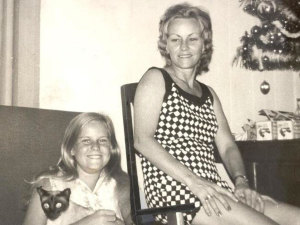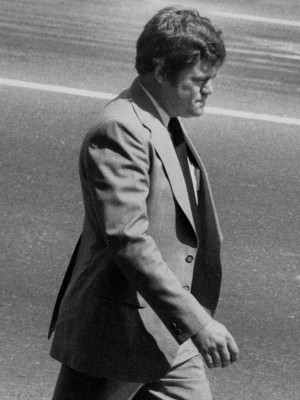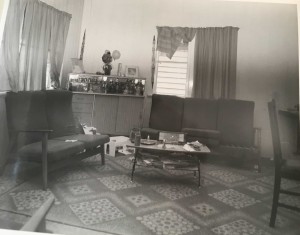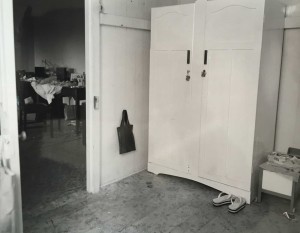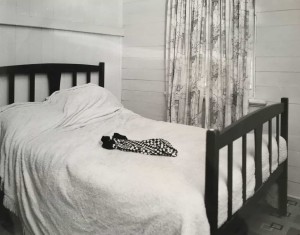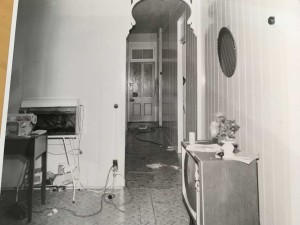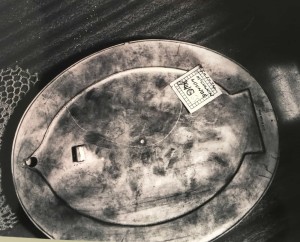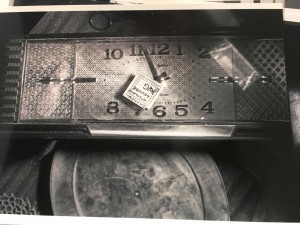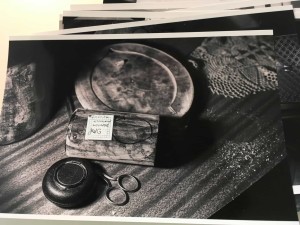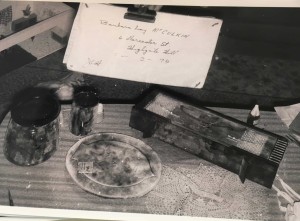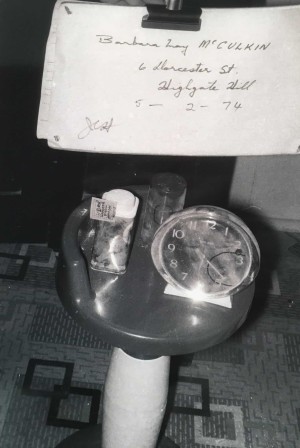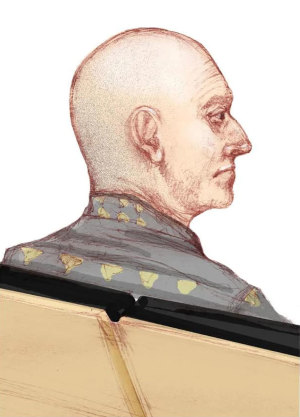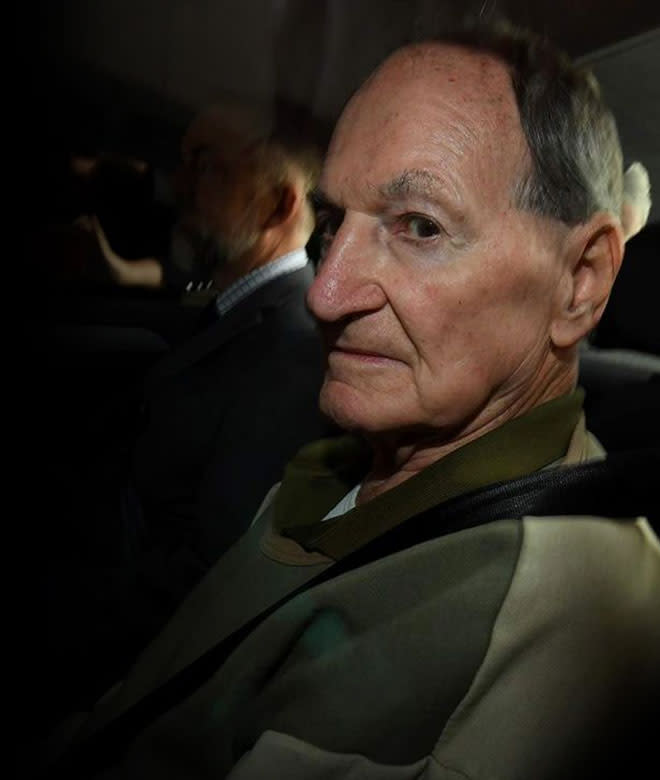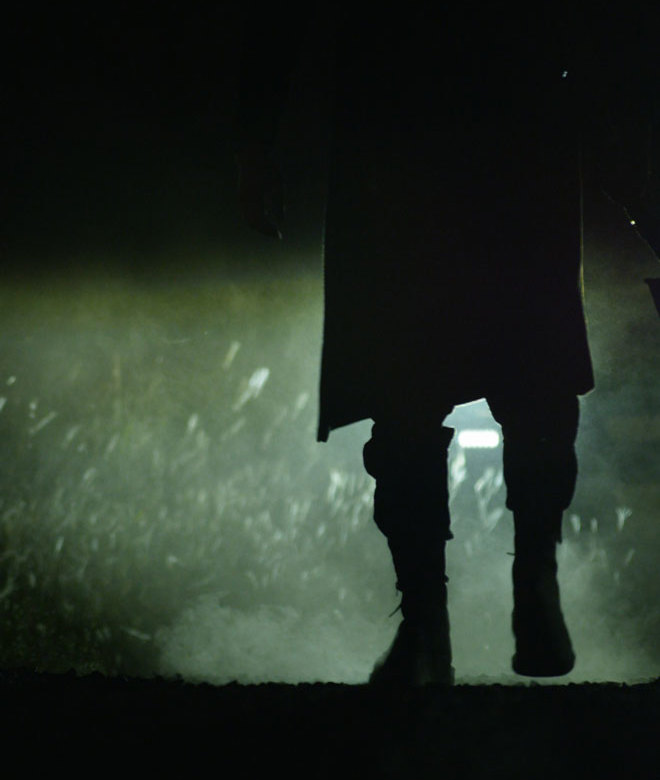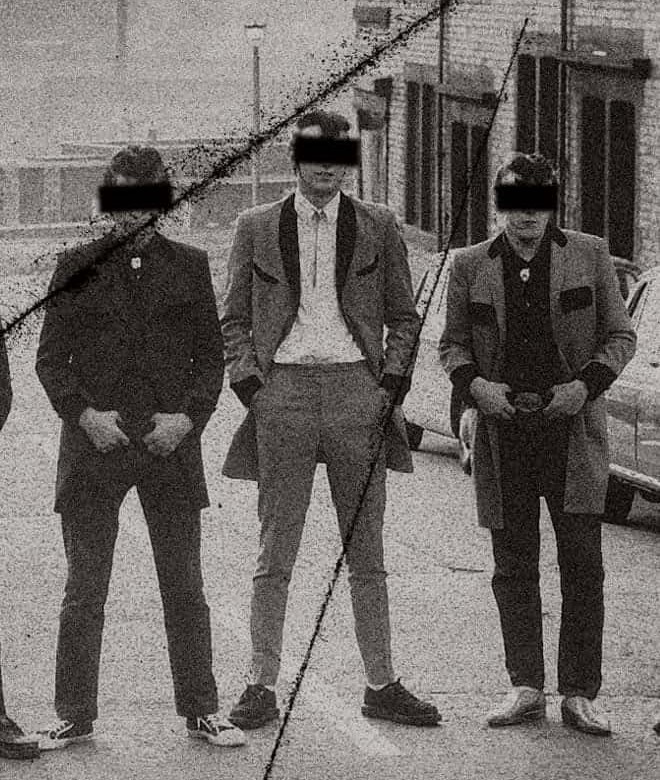Whooshkaa Studios: Listeners are advised that this podcast contains corse language and adult themes and is not suitable for younger ears.
DETECTIVE BRUCE WHITE: There are a number of questions I’d like to ask you and if need be you can have your solicitor present. That makes no difference to me. I have come here to try and establish the whereabouts of Mrs McCulkin and her daughters and if you can assist, I would be grateful. However, if you can’t assist then that is okay too.
VINCE O’DEMPSEY: Let’s hear what you’ve got to say then.
DETECTIVE BRUCE WHITE: Are you aware of the disappearance of Barbara May McCulkin and her daughters, Vicki Maree McCulkin and Barbara Leanne from Brisbane on or about the night of the 16th of January, 1974?
VINCE O’DEMPSEY: Yes, I have known about that for over a year.
DETECTIVE BRUCE WHITE: Did you know these people?
VINCE O’DEMPSEY: Yes. It is April 17, 1975, and what you are hearing is something incredibly rare. As unlikely as hen’s teeth, or snow in Warwick.
On that autumn day in Sydney, Vince O’Dempsey was interviewed by Queensland detective Bruce White in the offices of the Criminal Investigation Branch at Sydney police headquarters.
And White had the presence of mind to take extensive notes of that interview. If those notes are accurate, this is one of the only records of extended dialogue between Vince and the police.
Vince is famous for not talking. At an inquest in 1980, he answered “no comment” to every question asked of him, including what his name was. He never signed statements and he never spoke.
Except in this instance.
These are the words of Detective White and Vince. It’s not their voices.
DETECTIVE BRUCE WHITE: We received information from two girls who knew you that you were standing in the kitchen of the house talking to Mrs McCulkin on that night.
VINCE O’DEMPSEY: Who are those girls?
DETECTIVE BRUCE WHITE: They are playmates of Vicki and Barbara. Here, Vince has immediately identified the weak link in the chain of his denial. The Gayton sisters. His story wobbles.
VINCE O’DEMPSEY: The kids across the street know me and if they said I was there, then it is possible.
DETECTIVE BRUCE WHITE: Were you with Shorty?
VINCE O’DEMPSEY: I’m not saying.
DETECTIVE BRUCE WHITE: Our information is that Shorty was playing with the family cat in the front yard of the house.
VINCE O’DEMPSEY: Anything is possible.
DETECTIVE BRUCE WHITE: Are you aware of the present whereabouts of these members of the McCulkin family?
VINCE O’DEMPSEY: No. It is fifteen months since the McCulkins vanished. Vince is still on the move, trying to make money, trying to stay one step ahead of the police.
But Detective White persists, and has a face-to-face with his target.
You will hear more of this interview, but as the transcript reveals, Vince is arrogant, he adopts a superior tone, and you get the sense he knows he will never, ever get caught for the McCulkin murders
How do we have a record of this 45-year-old exchange? How do we have Vince’s voice, captured like a wasp in amber? We have it because it was embedded in the long forgotten transcript of an inquest in 1980 into the McCulkin disappearances.
White appeared as a witness, and produced his notebook from that interview with Vince in Sydney, and read it into the public record.
DETECTIVE BRUCE WHITE: Do you agree that Barbara was concerned with raising the girls to the best possible level?
VINCE O’DEMPSEY: Yes, she was a good woman, loved her kids and tried hard.
DETECTIVE BRUCE WHITE: Do you agree that she was finding it hard to do this with her financial position?
VINCE O’DEMPSEY: Probably was although I offered to help her with money when she told me about her operation but she said she could manage okay.
DETECTIVE BRUCE WHITE: If the kids’ welfare and education was so important to her, could you understand her leaving all the childrens’ books and clothing as well as her own behind if she voluntarily left the home to avoid Billy?
VINCE O’DEMPSEY: I can’t help you there.
DETECTIVE BRUCE WHITE: Can you tell me about your movements since the time you were last seen at the McCulkin home.
VINCE O’DEMPSEY: I don’t think it’s necessary.
DETECTIVE BRUCE WHITE: Perhaps it may assist us in some way.
VINCE O’DEMPSEY: I don’t think so and that’s it. But that wasn’t it. Not by a long shot.
From Whooshkaa Studios, I’m Matthew Condon and this is Ghost Gate Road. In this episode, we will take you to the brutal dark heart of a triple murder that still haunts Australia, and reveal for the first time another murder plot by Vince that will shock you to the core. And we will try and answer the biggest question of all - how did Vince O’Dempsey get away with cold-blooded murder for so long?
News and Archival footage with people close to O’Dempsey’s crimes, with tense music throughout.
ASSOCIATE:…he wasn’t the same…he had the serious worried look and he had that for some time
ASSOCIATE: There’s nothing, no nothing to indicate that she was going away. A purse was still there.
ASSOCIATE: He had sex with one of them, he didn’t say which one, he told Shorty to rape one of the girls while he raped the other one.
FAMILY OF BARBARA MCCULKIN: Barbara, Leanne and Vicki were lured from their homes by people they thought as friends and suffered unimaginable violence and cruelty resulting in their untimely and callous deaths.
It was a lonely Christmas for Barbara McCulkin and her daughters Vicki and Leanne at the end of 1973.
Her husband Billy had left her for another woman and had moved out of the family home in Dorchester Street, Highgate Hill.
And Barbara was recovering from an operation - cosmetic surgery to her breasts and to remove stretch marks - and had given up work at the Milky Way Snack Bar in the city.
Snack shop co-worker Ellen Gilbert later told police why Barbara had decided to have the operation, uncommon at that time:
ELLEN GILBERT: Mrs McCulkin informed me that her husband was extremely jealous of her and she further informed me she had particularly severe stretch marks in the abdomen area and…that she was very conscious of those stretch marks and would not have an affair with another man owing to her appearance and had arranged to have the operation to remove the stretch marks and so begin a new life for herself as her husband had deserted her. Billy dropped by now and then to see the girls.
But it was a miserable household. It had been raining relentlessly all through the school holidays.
Come January, a southbound cyclone from North Queensland and a hazardous weather system in northern NSW would come together with deadly force, creating the worst flooding in Brisbane in a hundred years.
People scrambled for their lives.
Audio from a documentary about the floods in Brisbane
VICTIM: We got out through the roof, it was the only way we could get out.
REPORTER: You just got out in time.
VICTIM: We just got out in time. We believe that the house has actually been covered by water. We’ve lost everything we owned.
VICTIM 2: it’s happened since friday morning,
REPORTER: You’ve lost your home?
VICTIM 2: Everything we have.
REPORTER: For the first time this century, flood waters invaded the heart of Brisbane. Swollen by massive volumes of water from upstream and backed by a tidal surge, the Brisbane River ignored its banks and swamped the Botanic Gardens. It wasn’t long before Alice Street fell victim. One of the first properties raped was the luxury Park Royal Hotel. More and more of the city disappeared under the murky water.
MARRIAGE COUNSELLOR: I think people mostly felt they just had nothing. Nothing was left. No home. No possessions. And worse than that, suddenly the family just wasn’t there. No one was there for each other anymore. I think the flood was probably the symptom and what was happening was people were concentrating on possessions, getting houses, getting things to put in the houses. When they lost all that, they’d forgotten who the other person in that house was.
Barbara, too, was trying to salvage her own life.
Into 1974, as the rain drummed on the corrugated iron roof at Dorchester Street, she tried to keep everything as normal as possible for the kids. She’d bought their books for the school year ahead, and was busy sewing them outfits.
The rain didn’t bother Vicki and Leanne. They played every day with their friends across the road - Janet and Juneen Gayton - and sometimes passed the time hanging out at the service station at the end of the street. Janet was 13, Juneen almost 10.
As Janet would later tell police:
JANET GAYTON: Well, we were going over to their place all the time and they’d come and visit us and I’d travel to school with Vicki and Mrs McCulkin would take of us, the family, and her family, skating every Saturday night. In fact, Juneen was turning 10 on Wednesday, January 16, and she was having a birthday party early that evening. Vicki and Leanne were invited.
But just before the celebration began, an orange Valiant Charger pulled up outside the McCulkin house. It was Vince O’Dempsey and Shorty Dubois. They had brought beer.
Little Juneen was watching the McCulkin house from the front verandah of her home. Then her sister Janet joined her and they walked across the road to find their friends.
Both girls were hypnotised by the Charger. It was Janet’s favourite car.
Juneen would later tell police:
JUNEEN GAYTON: I was standing at the front of my house and I saw two men walking into Vicki and Leanne’s place. One of these men was carrying a half-carton which looked like a XXXX beer box cut in half. Then I went to their house with Janet…and I saw one of the men playing with the cat Ginger Meggs in the front of their house and when Janet whistled and Vicki came out this man went into the house. Both Vicki and Leanne came out to where I was standing at the front gate of their house, and I said, ‘Are you coming over?’ The cake’s on the table.’ They both said ‘yes’. I did hear Vicki say, ‘Vince and Shorty are here.’ Janet asked what Shorty’s real name was and Vicki said he was ‘a friend of her father’s.’ The McCulkin girls then went across the road to the Gayton house. On that night, Vicki was wearing blue jeans with yellow stars on the flared cuffs, a tight-fitting red jumper with a zipper up the front and a Zodiac pendant around her neck. She was a Scorpio. And Leanne wore a pink smock covered in flowers and stripes, and pink stretch shorts.
The surprise visit of Vince and Shorty had interrupted Barbara at the sewing machine.
Soon, Shorty left in the Charger and drove across town to Chermside to give his girlfriend Jan a lift home, then briefly saw his mate, Clockwork Orange ganger Peter Hall, before racing back to Dorchester Street.
Hall told me what happened:
MATTHEW CONDON: And do you remember anything of that day, earlier in the day? Had you seen Shorty or had there been contact between you before that night on the day?
PETER: Yeah, he was over there late in the afternoon, because he’d come to pick Jan up. Her and Caroline had gone to the gym, even though she denies that that happened, but yeah.
MATTHEW CONDON: But had you seen Shorty earlier in that day?
PETER: No, not until then, I don’t think.
MATTHEW CONDON: So there wasn’t any suggestion that he was going to go over to the McCulkins that night or late afternoon?
PETER: No. I don’t know. Because when he came over to pick Jan up, he passed the invite out. Said did I want to come over there for drinks and sex. I said no.
MATTHEW CONDON: Yeah, but did you have any knowledge of the fact that it wasn’t just Barbara in the house, but that there were two children there as well?
PETER: No, I knew that McCulkin had daughters. How old they were, I wasn’t sure.
MATTHEW CONDON: But what was the implication from Shorty, now that you think of it in hindsight? Was there any doubt that those girls were going to be involved in the so-called sex party as well?
PETER: Yeah, looking back now I think the oldest one. And she was what? 14?
MATTHEW CONDON: Yeah. Back in Dorchester Street, Leanne McCulkin returned home from the Gayton party at around 7.30pm. She wasn’t feeling well. Vicki got in around 10.15pm.
Vince and Shorty - who was back after his errand across town - were still there with Barbara. They had been at the house for about four hours.
Then Vince suggested they all go for a drive in the two-door Valiant Charger. You might remember the TV advertisements for the sexy sports car. As one ad put it: “Not too big, not too small. Seats five. You can get the whole family in.”
Seats five. Barbara, Vicki, Leanne, Vince and Shorty.
Why go for a drive so late at night?
What had Vince and Shorty been waiting for?
Vicki McCulkin. They stuck around for the thirteen-year-old girl to come home from the Gayton party.
Shorty would later confess to Peter Hall what happened:
PETER: So it started out he told us that they’d sat there and they were invited to get into the car to go for a drive, which they did. And he said once they were drunk they put two of them in the back of the car because there are no back doors. I guess he said where they were when Vince said to him, tie them up. So he told me they tied them up while they were driving around. Headed off up to Warwick… By 10.30pm the Charger was heading south-west out of Brisbane to Ipswich, and then on to Warwick.
Towards Ghost Gate Road.
Vince drove them to the bush. To the pitch black hills outside Warwick. To the darkest recesses of his psychopathic mind, this place that had nurtured his fantasies and had mothered his evil. He drove them to the bush. To his private graveyard.
There are few details of the actual location, just ragged pieces of memory and faded snapshots of landscape.
According to Dubois, they headed to Warwick, then parked the Charger with the women tied up and marched them across a creek. There was a suggestion of willow trees and a small shed nearby.
Then it was a decent walk into bushland to the site of the rape and murders. Into Vince’s private graveyard, where other victims rested. A place where, as his wife Margaret would tell police years later, he could visit his dead whenever he liked.
PETER: So they walked not very far to a shallow creek which they crossed. Then they proceeded up into the hills Peter Hall heard what happened from Shorty:
PETER: and the next part of the story was he sat with the girls while Vince took her father away and he said, I’m sure he would strangle one because he could hear these horrible sounds. And then eventually he came running back down again and told Shorty to rape one of the girls while he raped the other one and he said it took a while before he could do anything. But he said he had sex with one of them, he didn’t say which one. The kids. Vicki, 13, and Leanne, 11. Tied up and there in the dark, almost certainly hearing the life being strangled out of their own mother. A few hours earlier, they had been at a friend’s birthday party, with candles and cake.
Hall remembered the story Shorty told him and fellow gang member Tommy Hamilton:
PETER: When they finished and then he said that you’ve got to kill one of them now and he said he couldn’t do it. He didn’t go into those details, I think, the look on Tom’s face and mine was enough to say that, don’t give us the details of what happened. How long had Vince and Shorty had their fun with the McCulkin women?
In those days, and depending on the weather, say it took them two and a half hours to get to the private graveyard outside Warwick from Brisbane. That makes it close to 1am.
And just say the walk from where Vince parked the Charger to the murder site was 15 or 20 minutes. We’re getting close to 1.30am. On average during January, at the height of the Australian summer, daylight is around 6am.
Hall recalls Shorty describing the horrific scene in the morning.
PETER: He said then they just sat there until the sun come up, so they could see what they were doing when they dug the grave. Because he said the worst sight was the morning, the bodies laying there all pale, in the sunlight when it first came up he said, that affected, I think that probably affected him worse than all the other. Made it sink in. Vince killed them all, Shorty said. Vince killed them all.
And there were poor Vicki’s last words, before her life was extinguished: Vince, please, not the knife.
Peter Hall found Shorty at his mother’s place in Brisbane late on Thursday, January 17. He had not been home that night.
Hall noticed that there was something different about his good friend. He was quiet. Troubled. Not his normal self.
I asked Hall about his memory of first seeing Shorty after the McCulkin murders.
MATTHEW CONDON: So just before that Peter, when you first saw Shorty, was there anything that indicated to you that he appeared different? Was there anything in his demeanour or anything at all that obviously he’s gone through an incredible event that night?
PETER: No, he wasn’t the same. You could just look at his face it was different. The way he spoke and…
MATTHEW CONDON: What was he more …
PETER: Yeah. He was how could we say, blasé about most things. He had the serious worried look. And he had that for some time afterwards.
MATTHEW CONDON: Yeah, and when he eventually unloaded to you on what had happened, was it long after you’d saw him that first time again?
PETER: No, I think it was probably about 20 minutes, half an hour where we sat in the car talking, we knew straight away something was wrong but then he started to tell us.
MATTHEW CONDON: And I mean as friends and you hadn’t been able to find him that day, you’d naturally you’d say, where have you been, I imagine?
PETER: Yeah, we said, well how come you didn’t come home the other night, that’s when he told us what had happened. In Dorchester Street, the day after Juneen’s birthday party, the Gayton girls were keen to hook up with Vicki and Leanne across the road. These were the dying days of school holidays, and they wanted to pack in as much fun as possible.
But their friends were nowhere to be found.
Years later, at the McCulkin inquest, Janet Gayton was asked by lawyer Gary Forno about this moment.
GARY FORNO: Could you tell us about that then, when you woke up the next morning, that’s the morning of the 17th of January, 1974. First of all, I take it, this was school holiday time, was it?
JANET: Mm.
GARY FORNO: Right. Alright. When you got up the next morning, what did you do?
JANET: Well, usually if we want them to come over we can see them from the front door…their house.
GARY FORNO: Yes.
JANET: So either myself or my sister would stand at the front door and whistle and they’d come out and see what we wanted. So I went and whistled and nobody came out. The place was closed.
GARY FORNO: I see.
JANET: So, we went over.
GARY FORNO: Where did you go when you went over there, what did you see and son on?
JANET: Well, we knocked on the front door and there was no answer. We walked around down the side because there was like a little driveway down the side. We walked down around there, around the bottom of the house and there was no sign of anybody. Billy McCulkin, oblivious to what had happened, arrived at the house on the Friday night to visit his family. He found the cottage locked, so he smashed a glass pane in the front door and let himself in. He discovered lights on, and the cats locked in the laundry. The beds had not been slept in.
He raced across town to various houses and made frantic phone calls.
He returned to Dorchester Street on the Saturday and bumped into Janet Gayton.
Did she know where Barbara and the kids were?
No, she said.
Had she seen anybody else at the house?
Yes, she said. On Wednesday night. Vince and Shorty were here.
Vince and Shorty were here.
With a mate, McCulkin immediately headed north across the river to the inner-northern suburb of Kedron and Shorty’s mother’s house. He confronted Vince and Shorty head-on with the information from the Gayton girl. Had they been in Dorchester Street on Wednesday night?
This is an account of that tense meeting, as Billy would tell police:
BILLY: I finished up talking to both of them. I then said to both Shorty and O’Dempsey, “Well, they are missing, if you know anything about it, tell me. I had to go to the bobbies about it. I’m worried about them. They both said that they would like to help, and I then said to Vince, “What were you doing there?” He said, “I wasn’t there.” I said, well, hang on, ten minutes ago you told me that you were there.” By that I meant he inferred that he had been there by his manner. O’Dempsey said, “I wasn’t there.” I then said to both of them, “Well I don’t know if she’s run off with anybody or anything like that, all I want to do is find out if she is alright.” They both said, “No, we don’t know anything.” I then said to both of them,” Well look, if anything has happened to them, I will blow the fucking head off the person whoever done it.” Billy McCulkin reported his family missing to police. But it wasn’t until the first week in February that detectives combed the house, taking photographs and dusting for fingerprints.
And on February 8, a full three weeks and one day after the disappearances, police issued a circular alerting authorities that Vince, Shorty and Dianne Pritchard were wanted for questioning in relation to the McCulkin case.
Why did it take so long for police to take seriously this potential triple murder?
Or had a highly ranked police officer ordered a go-slow on the investigation from the outset?
Former detective Alan Marshall, who investigated the McCulkin case for two years, remembers being shocked at the response time to the disappearances.
Billy McCulkin was similarly bemused.
Marshall recalls:
ALAN MARSHALL: Yeah. And it wasn’t until a couple of days after they’d actually disappeared that he turns up on the doorstep, he can’t find them and then he just looks like it was as if they’d just been plucked out of mid air, which they had been. The kids across the road, the Gayton girls. And then it was just, Billy knew that O’Dempsey had been sniffing around there and he just had a sense that something was wrong. And when he went to the police, and got nothing out of the police for, you know, all of the coppers of the Gabba would loved to just given him a flogging every time they saw him. Because he was such a smart ass and-
MATTHEW CONDON: And it was just two bit, two bit crook, Billy. Liar, thief mouthing off, crying Wolf possibly about his wife and children missing. So no one really took it seriously.
ALAN MARSHALL: Nobody, no. And it wasn’t until later on that things started to happen and I think as a result of Basil Hicks might’ve got his finger in the pie early and because Basil was a pretty, well on the non corrupt side of town, he was a pretty straight shooter, a decent person. And whereas a lot of the other blokes, just a shuffle away, too much other things happening and they were only missing persons and all these sort of things. They’ll turn up in time.
MATTHEW CONDON: I mean, you’re a professional police investigator, you know better than anybody that the more time that passes from the event as in that initial, even that initial two week window that happened because of no one taking this investigation seriously, could that have led to the fact that this ended up four decade cold case?
ALAN MARSHALL: Exactly. Exactly. Because it just wasn’t the intensity on that happening. It should have been looked and say, okay, where are they, make a few inquiries. All right. There’s nothing, no nothing to indicate that she was going away. A purse was still there.
MATTHEW CONDON: The sewing machine was still on.
ALAN MARSHALL: All those sort of things, they’re pretty indicative that something has happened and it’s serious. That check that was-
MATTHEW CONDON: The check in the letterbox.
ALAN MARSHALL: The whole box and I said, all your alarm bells start ringing immediately.
MATTHEW CONDON: I mean, did that shock you when you came back and looked at this case seriously years later? Was it shocking to see that in action?
ALAN MARSHALL: Yes. Yeah, it was. Whatever happened, Vince and Shorty were long gone by the time police entered Dorchester Street looking for evidence.
Vince and Dianne had hastily packed up their flat in Rosalie. He immediately sold his orange Charger to a car dealer in the city. Both then bolted south across the border. Shorty headed west to a friend’s property up on the Darling Downs outside Warwick.
The drama imploded the Clockwork Orange gang. Peter Hall moved out of Queensland. Keithy Meredith went to the Northern Territory.Tommy Hamilton stayed put in Brisbane.
The gang would never come back together. It was over.
Years later, Dianne Pritchard would be quizzed in a court of law about she and Vince’s sudden flight from Brisbane just days after the McCulkin disappearances.
Throughout her evidence, she expressed a lack of memory that was so complete it bordered on a possible medical condition.
She remembered nothing about suddenly leaving their flat at Nethercote Court in Rosalie, failing to give the landlord notice and forfeiting their bond, nor could she recall anything about Vince off-loading the Charger.
Lawyer Gary Forno pummeled her with questions about Vince, but, Pritchard didn’t crack.
GARY FORNO: Did he have anything to hide in selling his motor vehicle?
DIANE PRITCHARD: To my knowledge, he had nothing to hide, no.
GARY FORNO: Did he have anything to hide in leaving the flat at Nethercote Court?
DIANE PRITCHARD: Not to my knowledge. He didn’t give me that impression. And it was my idea to leave Brisbane so that’s why…I more so don’t think he had anything to hide.
GARY FORNO: Did he have anything to hide on the question of whether or not he was at Mrs McCulkin’s house on the 16th of January, 1974, to your knowledge?
DIANE PRITCHARD: No, I don’t think so. I don’t remember being given any indication that he was there even, he’s never given me the indication that he was there. The McCulkin inquest, in 1980, during which Pritchard was so intensely interrogated, as were so many other people who were involved in this drama but are now dead, did produce a very small fact that has been forgotten for forty years.
It is a possible hairline crack in the lies of Vince and Dianne, something so small that in their haste to get out of Brisbane after the McCulkin murders, the couple overlooked.
Is it evidence that Vince actually made a critical mistake when he fled south across the border? For a man who so prided himself in being meticulous, in his attention to detail, in his intellectual superiority, he may have missed one crucial thing.
It was about Vince’s beloved Valiant Charger.
At that inquest, a man by the name of John Joseph Johnstone was called to the stand.
We know Vince quickly sold his precious car to a used vehicle dealer before fleeing Queensland. The well-kept Charger didn’t sit long in the car yard.
The first person to purchase it, after Vince off-loaded it, was Brisbane man John Johnstone.
You will remember that at this time the city had suffered the worst flooding in a century. Johnstone was subsequently navigating inundated city streets in his snazzy new car, and at some point, the vehicle got damaged by floodwaters.
So Johnstone decided to do a thorough cleaning job and remove the internal seating and floor carpets.
And that’s when he found the hair ribbon.
This is Johnstone being questioned by Coroner Bourjoure and lawyer Claire during the inquest.
CORONER BOUJOURE: Can you describe the ribbon you found in the car, for me, a little bit more in detail?
JOHN JOHNSTONE: Oh, I think at the time, it would’ve just been a small blue ribbon, and that was it. I can remember it was just a small blue ribbon, possibly, oh, six to eight inches in length, and probably three eighths of an inch in width.
LAWYER CLAIRE: In relation to the ribbon, when you found it, was it tied in any way?
JOHN JOHNSTONE: No, it was untied. It was just…gave me the opinion, you know, it’s the type of thing that falls down behind the seat of a motor vehicle.
LAWYER CLAIRE: Mm, perhaps from…
JOHN JOHNSTONE: It could’ve been there one day. It could’ve been there one year, for all I know.
LAWYER CLAIRE: Mm. Perhaps from a child, or something like that?
JOHN JOHNSTONE: Possibly, yes. A blue hair ribbon. Possibly a child’s. A little girl’s.
Which little girls had Vince recently had in his Charger?
A thorough police search of the vehicle after the McCulkin case was first reported to police would have uncovered the ribbon.
But police didn’t start seriously investigating the McCulkin case for almost three weeks after their disappearance.
By then, the car had been sold to Mr Johnstone.
And it was never searched by detectives.
So Vince and Dianne, like Bonnie and Clyde, went on the run.
They based themselves largely in Sydney, but made quick, covert trips back to Brisbane. On at least one occasion, Vince went north to briefly see Shorty, and to visit an area of bushland outside his hometown of Warwick.
You may remember at the beginning of this episode a rare and critical police interview with Vince on April 17, 1975.
That interview only happened because Vince had been picked up by police in Sydney and charged with the unlawful possession of explosives, possession of Indian Hemp and use of an unlicensed pistol. Fleeing Brisbane after the McCulkin murders, Vince always carried a loaded pistol for protection.
He was ultimately convicted of possession of a firearm, possession of a sawn-off shotgun, and living off the earnings of prostitution, and would be sentenced to two years in prison.
But before that, Vince was brought into the Sydney CIB where Brisbane detectives took the opportunity to talk to him about the McCulkin case. He was finally caged. In custody. It was the only chance police would get to confront him.
In that interview, and again if Detective White’s notes are accurate, Vince was asked about his friendship with Barbara McCulkin.
DETECTIVE BRUCE WHITE: Is it true that you were good friends with Barbara McCulkin as well as Billy?
VINCE O’DEMPSEY: Yes.
DETECTIVE BRUCE WHITE: Did you ever meet her at work and take her home?
VINCE O’DEMPSEY: Yes.
DETECTIVE BRUCE WHITE: Did you ever take her out?
VINCE O’DEMPSEY: What do you mean?
DETECTIVE BRUCE WHITE: Did you ever drive her anywhere else except home from work?
VINCE O’DEMPSEY: I could have.
DETECTIVE BRUCE WHITE: Did you ever drive her anywhere while the children were present?
VINCE O’DEMPSEY: Sometimes.
DETECTIVE BRUCE WHITE: Where to?
VINCE O’DEMPSEY: I’ve taken them to see Billy when Barbara was short of money and wanted to see him. I would drive her and the kids around town to see if we could find him and when they saw him, drive them home.
DETECTIVE BRUCE WHITE: Is that all?
VINCE O’DEMPSEY: No, I’ve taken them for drives too.
DETECTIVE BRUCE WHITE: Where to?
VINCE O’DEMPSEY: Lone Pine and on picnics. I felt sorry for them.
DETECTIVE BRUCE WHITE: Why?
VINCE O’DEMPSEY: The way Billy treated them. It’s impossible to think of Vince feeling sorry for anybody. He wasn’t wired that way. But he seems to have been painting himself as a concerned friend and proxy father to Barbara and the girls.
He told police Billy was a deadbeat drunk. White pressed on in a different direction.
DETECTIVE BRUCE WHITE: Were you ever intimate with Mrs Barbara McCulkin?
VINCE O’DEMPSEY: Do you mean was I riding her?
DETECTIVE BRUCE WHITE: Yes.
VINCE O’DEMPSEY: No, I had Dianne. And you might recall, in that interview, that Vince showed a particular interest in the mention of the Gayton sisters from 7 Dorchester Street.
Let’s listen again to that exchange between Vince and Detective White:
DETECTIVE BRUCE WHITE: We received information from two girls who knew you that you were standing in the kitchen of the house talking to Mrs McCulkin on that night.
VINCE O’DEMPSEY: Who are those girls?
DETECTIVE BRUCE WHITE: They are playmates of Vicki and Barbara.
VINCE O’DEMPSEY: The kids across the street know me and if they said I was there, then it is possible. What we know about diagnosed psychopath Vince O’Dempsey is that his lifelong modus operandi has been this - if anyone threatens his liberty, he removes that threat.
Why did his ears prick up in that interview when the Gayton girls were mentioned?
Because Vince, very early in the piece, identified Vicki and Leanne’s friends as the vital link in the chain of potential evidence against him in relation to the McCulkins. Janet and Juneen Gayton were able to place Vince and Shorty at 6 Dorchester Street on the night the McCulkins disappeared. Janet and Juneen would be able to testify, in court, that Vince and Shortly were probably the last people to see the McCulkins alive.
So what does Vince do about this conundrum?
They are a potential threat to his freedom.
And Vince knew how to handle threats.
So he planned to have not just Janet and Juneen, but the entire Gayton family, eliminated.
Now, for the first time, you will hear of a murder plot planned by Vince over 45 years ago that rivals the McCulkin murders in its pure evil.
Only now are Vince’s former criminal mates willing to reveal what the man was really like at heart. A monster with absolutely no regard for human life.
Recently, Vince’s buddy Bob - the man who was released from Boggo Road on the same morning as Vince back in late 1970, told me about Vince’s plan to exterminate the Gaytons.
Firstly, after the April 1975 police interview in Sydney when Vince was held in custody and ultimately convicted of various charges, Vince managed to get a message to Shorty. Someone phoned Shorty with instructions.
Bob remembers the moment with absolute clarity.
MATTHEW CONDON: Sorry, can you run that by me again? So Peter received a phone call?
BOB: You better sit down. Shorty told him…Shorty got the phone call…
MATTHEW CONDON: Shorty got the phone call.
BOB: …the phone call was about a request from Vince, if Peter would kill the two children. The Gaytons.
MATTHEW CONDON: Oh my god. Then a letter arrived for Shorty. Bob held it in his hands. It was precise instructions for Peter Hall on how to murder the Gaytons.
BOB: And then the letter came. The letter was like nothing I’ve ever read, Matt. I’m not joking.
MATTHEW CONDON: Can you see it in your mind’s eye, was it very long?
BOB: It was long enough to be detailed. Which completely surprised me. Now if he was already incarcerated, I’ve got something in me mind… how would you trust that to be carted out of the jail by someone.
MATTHEW CONDON: So is it, before the letter arrives, Shorty gets the phone call.
BOB: Yes, before the letter came.
MATTHEW CONDON: Vince didn’t make the phone call?
BOB: No. He wouldn’t have made it…. The letter from Vince had been posted to Shorty’s mother in suburban Kedron in Brisbane.
MATTHEW CONDON: So the letter arrives, posted to Shorty, I assume at his mother’s house in Kedron.
BOB: His mother’s house, yeah.
MATTHEW CONDON: Did you just happen to visit or did Shorty carry the letter around, how did you get to see it?
BOB: Well I arrived and he showed me the letter, I don’t know if he got it out of the box, I can’t remember, and I know I said to him, I said, you can’t fucking do that.
MATTHEW CONDON: …it was substantial enough and you remember it was specific instructions.
BOB: Specific instructions, yeah.
MATTHEW CONDON: On how to…
BOB: Drums of petrol under the house…
MATTHEW CONDON: This is the Gayton girls across the road. The family home.
BOB: The Gayton girls across the road…and gelignite with the bloody drums.
MATTHEW CONDON: Right, to place the drums and gelignite at the front and back doors…
BOB: Or under the house.
MATTHEW CONDON: Or under the house.
BOB: Yeah.
MATTHEW CONDON: And specific details on amount of fuel, amount of gelignite.
BOB: Yeah, I can’t remember, I think it was like…it was drums of petrol, you know, like 20 litre drums.
MATTHEW CONDON: He might have had experience at that with the Whiskey.
BOB: Yeah.
MATTHEW CONDON: What on earth did you think when you read that?
BOB: Fucking horrified.
MATTHEW CONDON: Yep.
BOB: I said to Shorty, I said, you can’t do that. I was quite outspoken about it.
MATTHEW CONDON: Yeah.
BOB: I said you want to fucking rip that up and get rid of it.
MATTHEW CONDON: Shorty surely wasn’t considering it?
BOB: I thought…Peter kept saying to me, Shorty asked me to do it. And I think I told you I said, I thought he just sort of dismissed it. And then Peter told me just recently that Shorty had asked him to do it, but I didn’t know he meant beforehand.
MATTHEW CONDON: Before what?
BOB: Before the letter.
MATTHEW CONDON: Really?
BOB: Vince wanted him to do it. Shorty delivered the message in a better way to put it.
MATTHEW CONDON: How did Vince think he could just get Peter Hall to murder an entire family at the click of his fingers?
BOB: Well, this is what he tries to get people to do. Peter Hall also remembers the incident all too clearly.
PETER: It first turned up as a request over the phone. And I’m not sure who made the phone call, I think it might have been Di, to Shorty’s residence, and the first request was for me to go and kill the two little girls. I thought fucking hell. Then when the letter come, and he read it, and he said he wants the whole family put off. The parents. The two kids. Burn the house down. Blow it up. I didn’t want to see that. I said get rid of it.
MATTHEW CONDON: I mean that’s just insane.
PETER: It is. I don’t know where it would’ve stopped, you know? The next request probably would have been the neighbour. He knew they were there.
MATTHEW CONDON: Yep.
PETER: It was a defining moment, I have to say that. There was something else in the letter. Something more Vince wanted Shorty to do.
He ordered his little mate - in his tiny, crabbed handwriting - to head out to the private graveyard and dig up the bodies of the McCulkins.
In the letter, Vince told him to buy some large drums and gave precise instructions on submerging the bodies in acid.
Then to take the sludge and pour it into a fast-running creek.
Exactly 42 years after the letter and that hideous, heartless and cold-blooded plot to murder two more children, both Janet and Juneen, in middle age, would stand up in the Supreme Court in Brisbane at Vince’s trial for the triple murder of the McCulkins, and give evidence against him.
The precise evidence Vince identified, and was so fearful of, all those years ago.
I was in the courtroom when they stood in the witness box, and later approached them outside the court where they sat together, alone, these two sisters. I congratulated them on their fortitude, and their dedication to the memory of their childhood friends.
They simply said thank you.
It’s important to think about the scope of this whole sorry saga.
A serial killer had been allowed to live amongst us for decades. A killer who had never been held accountable for his murders.
That would change.
It would take half a lifetime for people close to Vince to have the courage to step up and tell police what they knew.
And it would take the tenacity of two extraordinary cold case detectives to finally get Vince to face trial for the McCulkin atrocities. Both officers were children when Vince was slaughtering innocents.
The final question remains. Where are Barbara, Vicki and Leanne, buried?
I have stood over what look like old graves.
And I have held suspicious samples of yellowing matter that looks like bone fragments found in the soil.
And the place?
Morgan Park. Where the old cricket oval used to be. Where Vince drank and raised hell with his mates in the 1950s. Morgan Park. Where he raped a young woman in the 1960s then recited Shakespeare. Morgan Park, not too far from Ghost Gate Road, a dedicated public nature reserve for decades and on the way to the Leslie Dam, where Vince once worked.
Morgan Park. Remote. Thick with bush. Bordered by a creek with willow trees along its banks.
Morgan Park.
The perfect location, if you were insane enough, for your own private graveyard.








